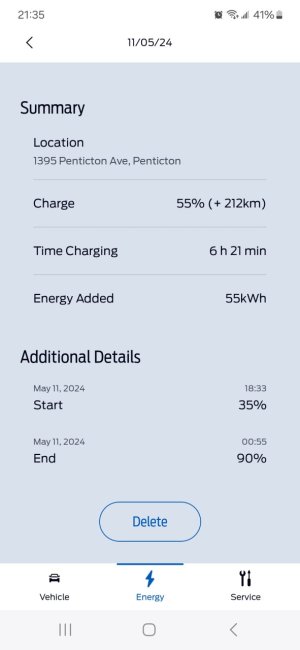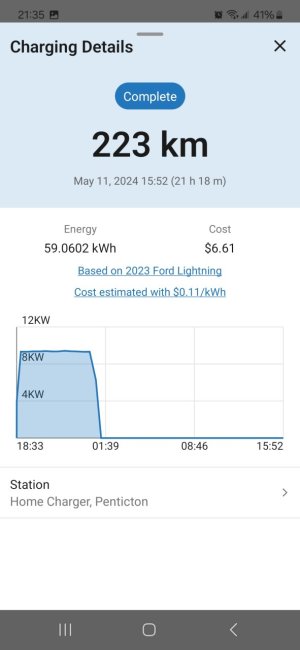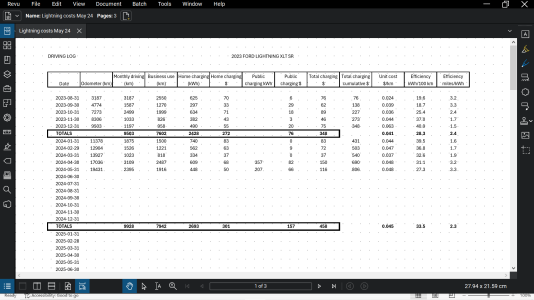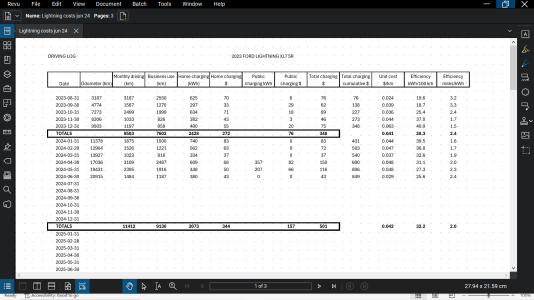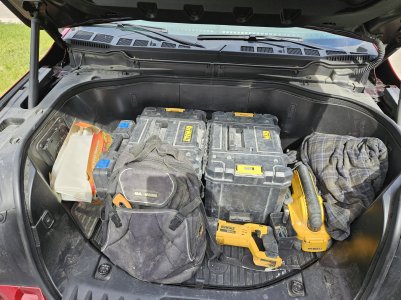A Report after two weeks of owning a Ford Lightning, extended range with trailer tow package. Stated range is accurate for non-towing trips, so happy with that. Have towed a 6000lb boat, 6000lb RV, and 20' flat-deck. Tows really well for a "half ton" truck. Not alot of squat. Very good power. Of course, the range is the big gotcha...range drops in half when I pull the RV and about 60% when I pull the boat. But I knew that going in to this, so am not planning long trips. Anything on Van Isle is well within reach, which is where we live. My main towing tasks are the boat (short hauls to/from the local launch) and farm stuff on the flat deck. The truck confidently pulls the boat out of a wet, steep launch, even better than my previous truck (Titan). I assume that's due to incredible torque, no transmission, and a bit more weight.
Charging at home is very cheap. Between $12 and $16, depending on the time of day.
Charging at DC fast chargers is about 4x more expensive...which is still cheap compared to gas, but much more than makes sense. I look forward to the days of competitive charging rates.
50A level two charger at home is a bit tedious to charge, if the truck is drained. Planning to install a 100A charger to speed things up.
I've ordered the adapter which allows charging at Tesla superchargers, which are way more reliable than pretty much every other charge network out there. One catch there is that most superchargers don't make it easy to pull through with a truck and trailer...so I expect to have to disconnect sometimes. Not ideal.
The pro power is a really nice feature, with almost 10kW of output, including a 220V circuit at 7200W. Have used it to run irrigation pumps and farm project which used to require lugging over a heavy generator. Considering the 130kWh battery capacity, I can run pumps and tools all day without worrying about battery depletion. The startup rush current of my larger irrigation pump flips the truck circuit breaker at 2400W. Will probably rewire that pump to 220V and then there would be no issues.
EV tires are efficient, but I can see that they won't do great in mud/snow. Somehow they did get M+S rating, so the cops won't hassle me on the Malahat. The truck has very low ground clearance relative to competition and regular F150's, so off-road use where ground clearance is needed is more or less out of the question.
Ford software is not great. Hopefully they invest in some good coders and catch up to competition, like Tesla. Tesla offers better trip planning and energy use prediction, and arguably a better user interface (if you can tolerate everything going through a big screen).
Not a fan of nearly all controls going through a big screen. Way too many screen taps to do basic stuff like change radio stations, or change the heat/AC settings.
The bluecruise system is nowhere close to Tesla's autopilot, but I don't mind because I don't trust either and won't pay to subscribe. It is useful for basic lane centering and adaptive cruise. Even when bluecruise is not on, the truck 'watches' the driver's eyes and squawks if you are looking away too much. I have no idea how it works when sunglasses are being worn.
The truck is obscenely fast accelerating from any speed. About the same acceleration as a dual motor extended range Tesla car, which is nuts. I wish it had a chill mode for teenage drivers.
Its also quite the conversation starter, especially when pulling my Silver Streak.


